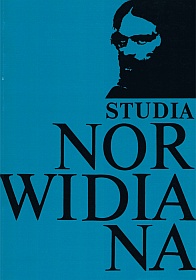The Essayistic Element in Norwid's Prose
Abstract
Norwid's `grammar of genres' transcends the conventions of its time. For one thing, his output includes many pieces which implement a different genre from the one signalled in their title, subtitle or initial parts, and secondly, one can see an intention to create new literary forms. Both tendencies are particularly manifest in Norwid's prose. The present author proposes to consider them in the light of the tradition and poetics of the essay.
Essayistic writing thrives in the cultural soil of crises in the collective consciousness connected with violent historical and civilizational change. That was precisely how Norwid viewed his own times. Analysis reveals that in his essays he did not draw directly on the tradition of the Renaissance beginnings of the genre (Montaigne, Bacon), but mainly drew instead on its ancient anticipations (such as the treatise, letter and dialogue), on the sylvan features of the prose of the period between the November and January uprisings, and on the essays of the American transcendentalists.
The morphological characteristics of Norwid's prose also show affinities with the poetics of the essay. The author exemplifies the above thesis by analyzing the subject, focusing on the construction of space and time, the mutual complementarity of image and discourse, the frequency and function of repetitions, and the use of quotations and literary allusions.
She finds Milczenie (Silence) to be the epitome of the essayistic element in Norwid's prose and asserts that it can be read as an essay on the essay. This is suggested particularly by those parts of Norwid's work which are devoted to thoughts on “approximation” (à peu près) as opposed to “system”. A quest for the truth by “approximations”, i. e. trials, without illusion that the whole can be attained, can be regarded as essential to the attitude of Norwid the essayist.
Copyright (c) 1994-1995 Studia Norwidiana

This work is licensed under a Creative Commons Attribution-NonCommercial-NoDerivatives 4.0 International License.





